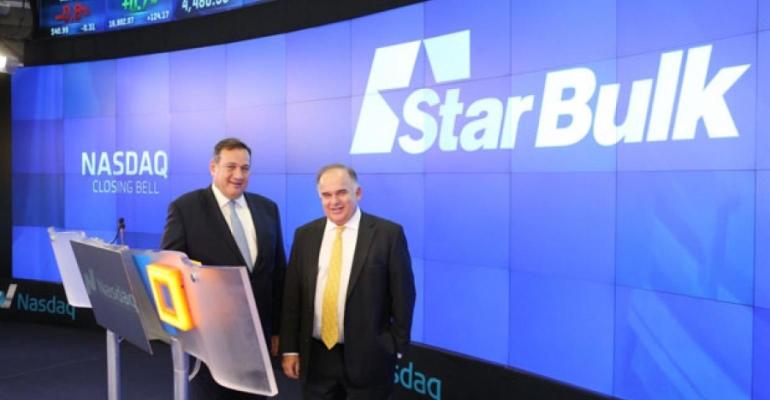The Nasdaq-listed shipowner Cash flowing to the bottom line can be explained by the reported time charter equivalent (TCE) over its fleet netting out to just shy of $23,000 per day, per vessel, against daily expenses of $5,400 per day, per vessel (including the G&A component).
The company is now very much riding the drybulk market’s enormous wave. The parts of the fleet which are not trading in the booming spot market are covered for very short-term deals; CEO Petros Pappas, said that 65% of the fleet was covered into Q3 at levels above about $28,500, and that “we have almost no cover for Q4 onwards.”
He did hint chartering strategies were evaluated on an ongoing basis, but emphasized that: “We very much believe in the market in the next few months…actually in the next few years.”
While the starlight is bright, the prices for dry bulk shares generally have backed off from highs set during June. Star Bulk is no exception, seeing its prices peak at $24 per share, representing a four-fold increase from prices in late 2020, its recent closing prices have hovered around $18 - $19 per share. This does have an impact on Star Bulk’s strategy of fleet expansion through “shares for ships” deals.
On the call, one analyst did question whether Star Bulk’s strategies were continuing to work; company President Hamish Norton said simply, “We are stubborn people,” noting that the equity market’s tone may shift in the company’s favour.
The owner has taken a pause from recent “shares for ships” en-bloc acquisitions of drybulk vessels; not surprisingly, ship purchasing strategies and plans were also a subject of analyst questions.
In the Q & A following the prepared presentation, Norton explained Star Bulk’s strategy, putting together the multi-faceted asset owning, chartering, and financial strategies. He told investors: “What we want to do is to use the shares at the appropriate time to buy ships in such a way that it increases our earnings per share, our net asset value per share, our dividend per share, reduces our net leverage and reduces our average fleet age” – what he called “a quadruple or quintuple win”.
He added, “We think it’s actually going to be quite easy to do that in the right market.”
Also noteworthy are Star Bulk’s with the company managing to reduce its interest costs by adroit re-financing of approximately $390m of debt capital, with an annual interest cost savings of $5.5m.
The refinancing comes against the backdrop of reduced financial leverage, with the company saying: “Since the beginning of the year, we have been able to reduce our Net Debt by more than $228, due to strong cashflow from operations.” As at 30 June, total debt stood at $1.33bn, compared to approximately $1.6bn at the end of December.
Copyright © 2024. All rights reserved. Seatrade, a trading name of Informa Markets (UK) Limited.
Add Seatrade Maritime News to your Google News feed.  |

